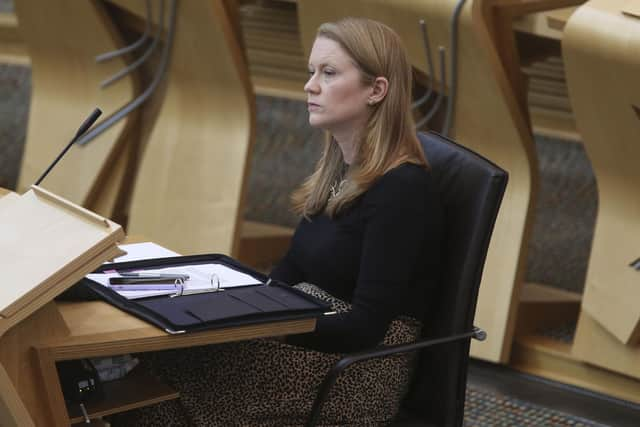Warnings SQA 'algorithm by stealth' could replicate 2020 fiasco
The warning, from lecturer and journalist James McEnaney, come after the Scottish Conservatives accused new education secretary Shirley-Anne Somerville of misleading Parliament around the 2021 exam results scandal.
Mr McEnaney, speaking to The Scotsman’s politics podcast The Steamie, said the approach being used by councils would “have ultimately the same kind of impact as the algorithm”.


Advertisement
Hide AdAdvertisement
Hide AdMs Somerville is under increasing pressure over the plans for the exams in 2021 following criticism of the SQA’s appeals system unveiled last week.
The new appointee, who replaced deputy first minister John Swinney in the high-pressure role after the election, is now facing allegations she “misled” Holyrood in saying there was no algorithm or use of historical data in this year’s approach to exam results.
Pointing to an Education Scotland document that states school staff will “analyse provisional results” against “historical data” and take into account historic trends when deciding grades, the Scottish Conservative’s education spokesperson Oliver Mundell said the Scottish Government had “introduced an algorithm by stealth”.
He said: “The SNP education secretary has misled Parliament, parents and pupils by falsely claiming that grades will not be based on historical data.
“This document confirms that the SNP have introduced an algorithm by stealth and kept it under the radar to avoid the inevitable and justifiable outrage.
“Limiting pupils’ grades using historical data and an algorithm is deeply unfair. It wrongly punishes young people because of their postcode, background or where they went to school.
“But the SNP and SQA are sleepwalking into the same shambles we saw last summer, only this time they’re being even more secretive. They seem to have replaced one flawed algorithm with dozens.”
Speaking to The Steamie, Mr McEnaney, who is writing a book on Scotland’s education system, said the “bespoke data analysis tools” could see the poorest pupils hit hardest by a broken system.
Advertisement
Hide AdAdvertisement
Hide AdThe lecturer said the use of historic data would “pressurise teachers” and would pass on the job of moderation from the SQA to local councils.
Mr McEnaney said: “That is, in and of, itself designed to pressurise teachers into keeping results this year in line with all of those past years because otherwise somebody might kick off about them.
"So even though the SQA made a very big deal saying that they were not going to moderate grades and the First Minister is clinging to that, there is this system in place where councils have sort of being made to do that moderation job for the SQA, but do it in advance of the grades.
"That is actually very serious because that is going to have ultimately the same kind of impact as the algorithm did.
"That says that you have got too many As so a few of them are going to have to become Bs and as soon as you start doing that, you will find that not every time but broadly speaking, you are likely to find the less affluent kids are more likely to be affected by that than the more affluent.”
The Scottish Government and the SQA have been contacted for comment.
Readers can listen to the full interview with Mr McEnaney on The Steamie.
The Steamie is available from all of your favourite podcast providers, including Apple Podcasts and Spotify.
A message from the Editor:
Thank you for reading this article. We're more reliant on your support than ever as the shift in consumer habits brought about by coronavirus impacts our advertisers.
If you haven't already, please consider supporting our trusted, fact-checked journalism by taking out a digital subscription.
Comments
Want to join the conversation? Please or to comment on this article.
